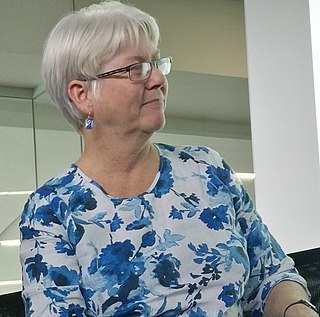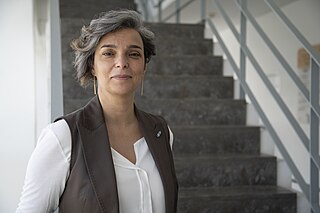
The American Society for Biochemistry and Molecular Biology (ASBMB) is a learned society that was founded on December 26, 1906, at a meeting organized by John Jacob Abel. The roots of the society were in the American Physiological Society, which had been formed some 20 years earlier. ASBMB is the US member of the International Union of Biochemistry and Molecular Biology.
Sheena Elizabeth Radford FRS FMedSci is a British biophysicist, and Astbury Professor of Biophysics in the Astbury Centre for Structural Molecular Biology, School of Molecular and Cellular Biology at the University of Leeds. Radford is the Associate Editor of the Journal of Molecular Biology.

Leann Tilley is Professor of Biochemistry and Molecular Biology in the Bio21 Molecular Science and Biotechnology Institute, The University of Melbourne.
David Chaim Rubinsztein FRS FMedSci is the Deputy Director of the Cambridge Institute of Medical Research (CIMR), Professor of Molecular Neurogenetics at the University of Cambridge and a UK Dementia Research Institute Professor.
Susan Taylor is an American biochemist who is a Professor of Chemistry and Biochemistry and a Professor of Pharmacology at the University of California, San Diego. She is known for her research on protein kinases, particularly protein kinase A. She was elected to the Institute of Medicine and the United States National Academy of Sciences in 1996.

Mark Andrew Lemmon an English-born biochemist, is the Alfred Gilman Professor and Department Chair of Pharmacology at Yale University where he also directs the Cancer Biology Institute.

Catherine Louise Day is a New Zealand biochemist. She is currently a professor and was the head of the biochemistry department at the University of Otago.
Marion Sewer (1972-2016) was a pharmacologist and professor at the University of California, San Diego's Skaggs School of Pharmacy and Pharmaceutical Sciences known for her research on steroid hormone biogenesis and her commitment to increasing diversity in science. Much of her research centered around cytochrome P450, a family of enzymes involved in the conversion of cholesterol into steroid hormones. She died unexpectedly at the age of 43 from a pulmonary embolism on January 28, 2016, while traveling through the Detroit airport.
Alan Frederick Cowman AC, FRS, FAA, CorrFRSE, FAAHMS, FASP, FASM is an internationally acclaimed malaria researcher whose work specialises in researching the malaria-causing parasite, Plasmodium falciparum, and the molecular mechanisms it uses to evade host responses and antimalarial drugs. He is currently deputy directory of the Walter and Eliza Hall Institute of Medical Research (WEHI) in Melbourne, and his laboratory continues to work on understanding how Plasmodium falciparum, infects humans and causes disease. He was elected as a fellow of the Royal Society in 2011 and awarded the Companion of the Order of Australia in 2019 for his "eminent service to the biological sciences, notably to molecular parasitology, to medical research and scientific education, and as a mentor."

Maria Manuel Mota is a Portuguese malariologist and executive director of the Instituto de Medicina Molecular João Lobo Antunes, Lisbon.
Kim Orth is a microbiologist and biochemist. She is the Earl A. Forsythe chair in biomedical science and professor of molecular biology and biochemistry at UT Southwestern. She is a Howard Hughes Medical Institute investigator and a member of the National Academy of Sciences. Her research focuses on bacterial pathogenesis.
Barry H. Honig is an American biochemist, molecular biophysicist, and computational biophysicist, who develops theoretical methods and computer software for "analyzing the structure and function of biological macromolecules."
Karen Renee Gibson Fleming is a Professor of Biophysics at Johns Hopkins University. She investigates the energetics of transmembrane helix-helix interactions. Fleming was awarded the 2020 Protein Society Carl Brändén Award.

Alexandra C. Newton is a Canadian and American biochemist. She is a Distinguished Professor of pharmacology at the University of California, San Diego. Newton runs a multidisciplinary Protein kinase C and Cell signaling biochemistry and cell biology research group in the School of Medicine, investigating molecular mechanisms of signal transduction in the Phospholipase C (PLC) and Phosphoinositide 3-kinase signaling pathways. She has been continuously funded by the US National Institutes of Health since 1988.
Judith Frydman is a biochemist and the Donald Kennedy Chair in the School of Humanities & Sciences and Professor of Genetics at Stanford University. Her research focuses on protein folding.

Cheryl Ann Kerfeld is an American bioengineer who is Hannah Distinguished Professor at Michigan State University. She holds a joint position at the Lawrence Berkeley National Laboratory. Her research considers bioinformatics, cellular imaging and structural biology.
Margaret A. Phillips is an American biologist who is the Sam G. Winstead and F. Andrew Bell Distinguished Chair in Biochemistry at the University of Texas Southwestern Medical Center. She was elected a Fellow of the National Academy of Sciences in 2021.
Eileen White is an American professor and scientist who currently serves as deputy director, chief scientific officer, and associate director for basic science at the Rutgers Cancer Institute of New Jersey. She is also the distinguished professor of molecular biology and biochemistry at Rutgers University. White was elected member of the National Academy of Sciences in 2021.
Patricia Louise Clark is an American biophysicist. She is the Rev. John Cardinal O’Hara, C.S.C., Professor of Chemistry and Biochemistry, associate vice president for research, and director of the Biophysics Instrumentation Core Facility at the University of Notre Dame.
Richard James Youle is an American neurobiologist and molecular biologist. He is a Distinguished Investigator and head of the Biochemistry Section at the National Institute of Neurological Disorders and Stroke (NINDS) of the National Institutes of Health (NIH) in Bethesda, Maryland.







